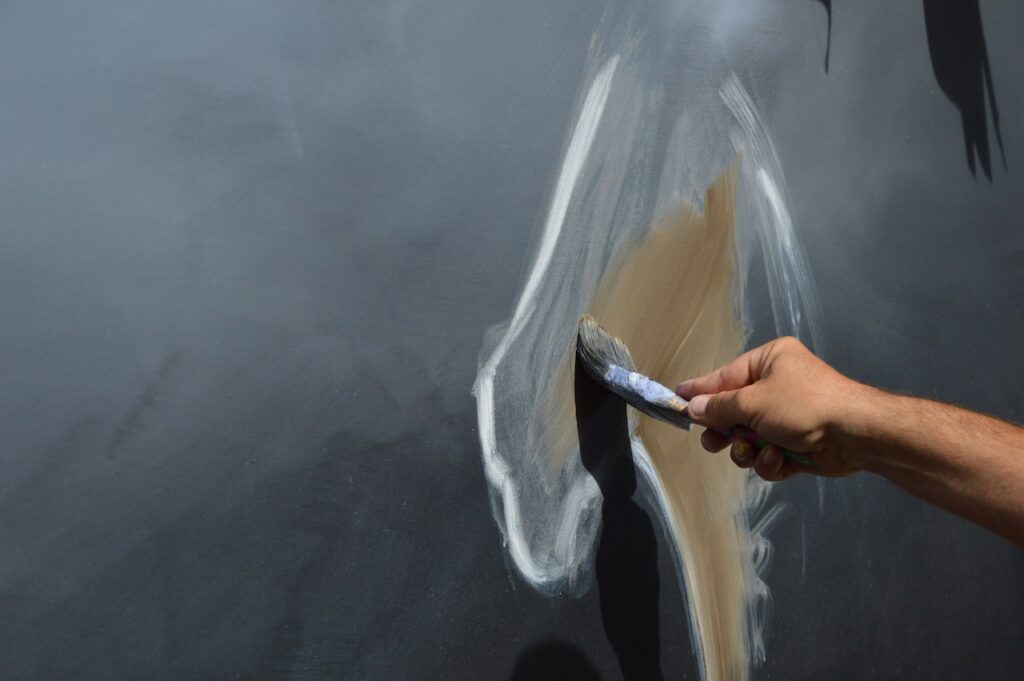Are you ready to give your commercial building a fresh coat of paint? Before diving into the world of commercial painting, it’s crucial to understand the ins and outs of this industry. Hiring a professional painter for your major painting project can make all the difference in achieving outstanding results.
Proper preparation is key. By ensuring that surfaces are well-prepared, you can guarantee a long-lasting and visually appealing paint job. But how do you choose the right commercial painter for your business or community?
In this guide, we’ll walk you through everything you need to know about commercial painting. From understanding different materials and surfaces to finding reputable commercial painting contractors like Robinson Painting, we’ve got you covered. So let’s dive in and discover the secrets behind achieving a flawless paint finish for your commercial space.
Table of Contents
ToggleUnderstanding Different Types Of Painters
It’s essential to understand the distinction between residential and commercial painters. While both types are skilled in the art of painting, they have different areas of expertise and experience.
1. Distinction Between Residential And Commercial Painters
Residential painters primarily focus on painting houses and other residential properties. They are well-versed in techniques that suit smaller-scale projects, such as single-family homes or apartments. On the other hand, commercial painters specialize in larger-scale projects like office buildings, retail spaces, hotels, and industrial complexes.
2. Specialized Skills Required For Commercial Projects
Commercial painting projects often involve complex structures with unique challenges. Therefore, professional commercial painters possess specialized skills that enable them to handle these tasks efficiently. They are experienced in working with various surfaces such as concrete, metal, wood, and stucco.
They have a deep understanding of safety regulations specific to commercial settings. This knowledge ensures compliance with industry standards while minimizing any potential risks during the painting process.
3. Importance Of Hiring Experienced Commercial Painters
When undertaking a commercial painting project, it is crucial to hire experienced professionals who have a proven track record of delivering high-quality results. Experienced commercial painters possess the necessary knowledge and expertise to tackle intricate tasks effectively.
Moreover, their experience allows them to anticipate potential challenges that may arise during the project and address them promptly. By hiring an experienced painter or painting contractor for your commercial needs, you can ensure a smooth workflow from start to finish.
4. Different Types Of Commercial Painting Services Available
Commercial painting services encompass a wide range of offerings tailored to meet various business requirements. Some common types include:
- Interior Painting: This involves refreshing the interior walls and ceilings of a building with a fresh coat of paint.
- Exterior Painting: Commercial exterior painting focuses on enhancing the appearance and protection of a building’s exterior surfaces.
- Industrial Painting: This type of painting involves specialized coatings and techniques for industrial facilities, such as factories or warehouses.
- Institutional Painting: Institutional painters specialize in painting educational institutions, hospitals, government buildings, and other public spaces.
- Specialty Coatings: Commercial painters may also provide specialty coating services like waterproofing, epoxy flooring, or fireproofing.
By understanding the different types of commercial painting services available, you can select the appropriate painter or contractor based on your specific project requirements.
Importance Of Warranties And Guarantees
Understanding the significance of warranties is crucial. A warranty not only protects your investment in paintwork but also ensures that you receive satisfactory customer service throughout the process. As a savvy customer, it’s important to evaluate warranty options from different painters before making a decision.
One of the main reasons why warranties are essential in commercial painting is because they provide peace of mind. When you hire a painter who offers a warranty, you can rest assured knowing that any potential issues or damages will be taken care of by the company. This means that if there are any problems with the quality of the paint job or if it starts to peel or fade prematurely, the painter will address these concerns without charging you extra bucks.
Another factor to consider when evaluating warranty options is the reputation of the painting company. A reputable company will stand by its work and offer comprehensive warranties that protect your investment. Look for painters who have a track record of satisfied customers and positive reviews. This way, you can be confident that they will honor their warranty commitments and provide excellent service.
Clear communication regarding guarantees and warranties is vital when hiring a commercial painting company. Make sure you understand what is covered under the warranty and for how long it is valid. Ask questions about any specific conditions or limitations that may apply. By having all this information upfront, you can avoid any misunderstandings or disputes down the line.
In addition to protecting your investment in paintwork, warranties also safeguard your property from potential damage during the painting process. Accidents happen, and furniture or other items may get damaged while painters are working on your premises. With a good warranty in place, any such damage should be repaired or replaced by the painting company at no extra cost to you.
It’s worth noting that different companies may offer varying types and lengths of warranties for their services. Some may provide longer-term warranties for both labor and materials, while others may only offer warranties for a limited time. Consider your specific needs and the condition of your property’s walls when deciding which warranty option is best for you.
To summarize, when hiring a commercial painting company, it’s essential to understand the importance of warranties and guarantees. They protect your investment in paintwork, provide peace of mind, and ensure that any damages or issues are addressed promptly. By evaluating warranty options from different painters and communicating clearly about the terms, you can make an informed decision that will benefit both your property and your wallet.
Checking Credentials, Insurance, And Licenses
It’s crucial to do your due diligence before making a decision. Verifying credentials, insurance coverage, and licenses is an essential step in ensuring that you hire a professional who meets all the requirements for the job. Let’s dive into why these factors are so important.
The Importance Of Verifying Credentials Before Hiring A Painter
Checking the credentials of a commercial painter can give you valuable insights into their expertise and experience. Look for certifications or affiliations with reputable organizations in the industry. These credentials serve as evidence that the painter has received proper training and adheres to high standards of professionalism.
Contacting previous clients or reading online reviews can provide you with firsthand information about their work quality and customer satisfaction levels. A reliable painter will have no problem sharing references or showcasing their portfolio of completed projects.
Ensuring That The Painter Has Liability Insurance Coverage
Insurance is another critical aspect to consider when hiring a commercial painter. Accidents happen, even on well-managed job sites, so it’s vital to protect yourself from any potential liability. Make sure the painting company carries liability insurance that covers any damages or injuries that may occur during the project.
Liability insurance provides peace of mind knowing that if something goes wrong, you won’t be held responsible for any financial repercussions. Without this coverage, you could find yourself facing costly lawsuits or having to pay for damages out of pocket.
Checking If The Painter Holds The Necessary Licenses For Your Area
Before proceeding with any painting project, confirm whether the commercial painter holds all required licenses in your area. Licensing ensures that they have met specific criteria set by local authorities and possess the necessary skills to perform their job safely and effectively.
A licensed professional understands local regulations related to safety measures and environmental concerns. They will comply with these regulations while using appropriate tools and techniques throughout the project. Hiring an unlicensed painter may lead to subpar work, potential legal issues, and even financial penalties.
Confirming Compliance With Safety Regulations
Safety should always be a top priority when hiring a commercial painter. Look for painters who prioritize the well-being of their employees and adhere to safety guidelines. A reputable company will have proper safety protocols in place and ensure that all employees are trained on best practices.
Ask about the safety measures they take during projects, such as using protective gear, securing ladders properly, or implementing proper ventilation systems for paint fumes. A professional painter will willingly discuss their safety procedures and provide you with peace of mind knowing that the project will be conducted safely.
Evaluating Previous Work And Getting Multiple Quotes
It’s crucial to do your due diligence before making a decision. Evaluating previous work and getting multiple quotes are two essential steps in the process that can help you make an informed choice. Let’s dive into why these steps are important and how they can benefit you.
Reviewing A Painter’s Portfolio Or Previous Work
Before hiring a commercial painter, it’s essential to review their portfolio or previous work. This step allows you to assess the quality and durability of their completed projects. By looking at past work, you can get an idea of the contractor’s skill level, attention to detail, and overall style. It also helps you determine if their expertise aligns with your specific project requirements.
To evaluate a painter’s portfolio effectively, consider the following:
- Look for consistency: Pay attention to whether the painter consistently delivers high-quality results across different projects.
- Assess project scope: Determine if the contractor has experience handling projects similar in size and complexity to yours.
- Consider diversity: Check if the painter has worked on various types of commercial properties, such as offices, retail spaces, or warehouses.
Gathering Multiple Quotes For Comparison
Getting multiple quotes from different contractors is crucial when considering any commercial painting job. It allows you to compare pricing and services offered by each contractor. By doing so, you can ensure that you’re getting a fair deal without compromising on quality.
Here are some tips for obtaining multiple quotes:
1. Research online: Utilize search engines like Google to find reputable contractors in your area who specialize in commercial painting.
2. Request estimates: Reach out to several contractors and request detailed estimates for your project. Make sure they include all relevant costs such as materials, labor, and any additional services.
3. Consider referrals: Ask friends, colleagues, or other business owners for recommendations based on their past experiences with commercial painters.
4. Check online reviews: Look for online reviews and ratings of the contractors you’re considering. Pay attention to feedback regarding their professionalism, timeliness, and overall customer satisfaction.
By gathering multiple quotes, you can not only compare costs but also evaluate the level of expertise and customer service provided by each contractor. It’s essential to strike a balance between affordability and quality to ensure a successful painting project.
Considering References Or Testimonials From Past Clients
In addition to reviewing a painter’s portfolio and getting multiple quotes, it’s valuable to consider references or testimonials from past clients. These firsthand accounts provide insight into the contractor’s reliability, communication skills, and ability to meet deadlines.
When contacting references or reading testimonials, keep the following in mind:
- Ask about the client’s overall experience working with the painter.
- Inquire about any challenges that arose during the project and how the contractor handled them.
- Seek information on whether they would recommend the painter for future commercial painting jobs.
References and testimonials offer valuable perspectives that go beyond what you can gather from portfolios or estimates alone. They provide real-world experiences that can help you make an informed decision when hiring a commercial painting contractor.
Scheduling Impact And Availability Considerations
Scheduling is a crucial factor that can significantly impact the overall success of the endeavor. Before hiring a painting contractor, it is essential to consider various aspects related to scheduling and availability.
Potential Disruptions During The Painting Process
One of the primary concerns when planning a commercial painting project is minimizing disruptions to business operations or tenants. It is crucial to discuss with potential painters how they will handle any issues that may arise during the process. Will they work after business hours or on weekends to minimize disturbances? Understanding their approach will help you assess whether their strategy aligns with your requirements.
Evaluating Impact On Business Operations Or Tenants
Before hiring a commercial painter, it’s important to evaluate how the project’s timeline and activities will affect your business operations or tenants. Consider factors such as noise, odor, and limited access to certain areas within your space. Communicate these concerns clearly with potential painters and ask for their input on mitigating any potential disruptions. A professional painter should be able to provide solutions tailored to your specific needs.
Communicating Scheduling Requirements
Effective communication regarding scheduling requirements is vital for a smooth commercial painting project. Clearly define your expectations in terms of timelines, working hours, and any restrictions that may apply. This will enable potential painters to assess whether they can accommodate your needs without compromising quality or efficiency.
Consider providing them with details about peak hours or busy periods when minimal disruption would be ideal. By discussing these specifics upfront, you can ensure that both parties are on the same page from the start.
Evaluating Availability Based On Project Timeline
The availability of a commercial painter plays a significant role in determining whether they are suitable for your project. Evaluate their schedule about your desired timeline and determine if there are any conflicts or constraints that could impact their ability to complete the job within your required timeframe.
To avoid unnecessary delays or inconveniences, it is crucial to assess the availability of potential painters early in the selection process. If a painter has limited availability and cannot commit to your project’s timeline, it may be necessary to explore other options.
Conclusion: Key Takeaways From Commercial Painting 101
In conclusion, understanding the key aspects of commercial painting is crucial before hiring a professional. Let’s summarize the main takeaways from Commercial Painting 101:
1. Different Types of Painters: There are various types of painters, including residential painters, commercial painters, and industrial painters. It’s important to choose a painter who specializes in commercial projects to ensure the best results.
2. Importance of Warranties and Guarantees: When hiring a commercial painter, always check if they offer warranties or guarantees for their work. This ensures that any issues or touch-ups required in the future will be taken care of without additional costs.
3. Credentials, Insurance, and Licenses: Before making a decision, verify that the painter has proper credentials, insurance coverage, and valid licenses. This helps protect you from liability in case of accidents or damages during the painting process.
4. Evaluating Previous Work and Getting Multiple Quotes: Take time to evaluate a painter’s previous work by looking at portfolios or requesting references. Obtaining multiple quotes allows you to compare prices and services offered by different professionals.
5. Scheduling Impact and Availability Considerations: Discuss with potential painters about their availability and how long the project may take. Ensure that their schedule aligns with yours so that there are no delays or conflicts during the painting process.
To make your commercial painting experience successful, remember these key takeaways when selecting a professional for your next project.
If you’re ready to transform your space with a fresh coat of paint that will impress clients and boost employee morale, don’t hesitate! Start reaching out to reputable commercial painters today!
Looking For A Reliable Commercial Painting Service? Your Search Ends Here!
Breathe new life into your spaces with the masters of the craft, PaintMasters! Serving as the beacon of top-notch residential and commercial painting services in Concord, California since 1994, we have cemented our reputation throughout Lamorinda, Tri-Valley, Contra Costa, and the adjoining locales.
Our state-of-the-art 15,000 CFM spray booth armed with cutting-edge technology ensures your cabinets get the stellar finish they deserve. The PaintMasters team is not just about painting – we bring a breadth of skills to the table, including acoustic removal, drywall repair, and texturing. Our track record of transforming interiors and exteriors of custom homes and decks speaks for itself. With us, you can trust that the job gets done right the first time, every time.
Going beyond painting, we’re masters in the art of staining. Be it for interior or exterior walls, cabinets, doors, decks, or any woodwork, our expertise lends itself beautifully to both residential and commercial projects, including office spaces and restaurants. Whether it’s giving a fresh vibe to a dull room or adding a unique style element to a new space, PaintMasters is your one-stop solution.
Our commitment to delivering a spotless finish on each project is unwavering. Combining our intuitive design sense with top-tier technical skills, we guarantee results that will make you go “Wow!”
Don’t let another day pass by. Experience the transformational power of a superior paint job with PaintMasters. Reach out to us today via call or request an estimate online. We’re excited to help you reimagine your space! The journey to a transformed space begins here – contact us now!


